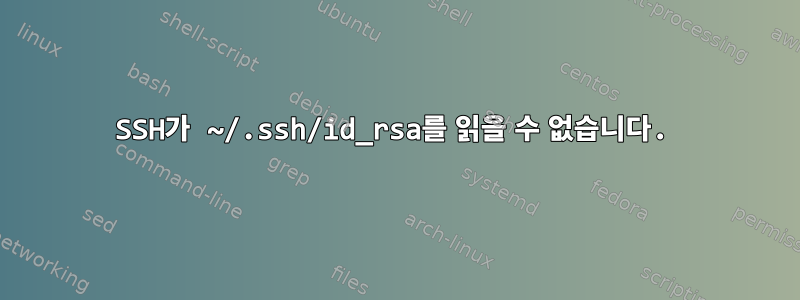
저는 호스팅 회사가 관리하는 원격 서버에 연결을 설정하려고 했습니다. 나는 그들에게 내 .pub 파일을 제공했고 그들은 그것이 서버의authorized_keys 파일에 추가되었다고 말했습니다. 내 연결은 항상 기본적으로 비밀번호 인증으로 돌아가는 것 같습니다. 저는 이것이 호스팅 회사의 문제라고 생각하여 해당 호스팅 회사와 연락 중입니다. 하지만 모든 일을 올바르게 수행했는지 확인하고 싶습니다.
ssh -vvv의 출력은 다음과 같습니다.
OpenSSH_7.2p2 Ubuntu-4ubuntu2.4, OpenSSL 1.0.2g 1 Mar 2016
debug1: Reading configuration data /etc/ssh/ssh_config
debug1: /etc/ssh/ssh_config line 19: Applying options for *
debug2: resolving "aqua2.nmsrv.com" port 22
debug2: ssh_connect_direct: needpriv 0
debug1: Connecting to aqua2.nmsrv.com [208.70.245.240] port 22.
debug1: Connection established.
debug1: identity file /home/karst/.ssh/id_rsa type 1
debug1: key_load_public: No such file or directory
debug1: identity file /home/karst/.ssh/id_rsa-cert type -1
debug1: Enabling compatibility mode for protocol 2.0
debug1: Local version string SSH-2.0-OpenSSH_7.2p2 Ubuntu-4ubuntu2.4
debug1: Remote protocol version 2.0, remote software version OpenSSH_6.7p1-hpn14v5
debug1: match: OpenSSH_6.7p1-hpn14v5 pat OpenSSH* compat 0x04000000
debug2: fd 3 setting O_NONBLOCK
debug1: Authenticating to karstsrv.nmsrv.com:22 as 'karst'
debug3: hostkeys_foreach: reading file "/home/karst/.ssh/known_hosts"
debug3: record_hostkey: found key type ECDSA in file /home/karst/.ssh/known_hosts:4
debug3: load_hostkeys: loaded 1 keys from karstsrv.nmsrv.com
debug3: order_hostkeyalgs: prefer hostkeyalgs: [email protected],[email protected],[email protected],ecdsa-sha2-nistp256,ecdsa-sha2-nistp384,ecdsa-sha2-nistp521
debug3: send packet: type 20
debug1: SSH2_MSG_KEXINIT sent
debug3: receive packet: type 20
debug1: SSH2_MSG_KEXINIT received
debug2: local client KEXINIT proposal
debug2: KEX algorithms: [email protected],ecdh-sha2-nistp256,ecdh-sha2-nistp384,ecdh-sha2-nistp521,diffie-hellman-group-exchange-sha256,diffie-hellman-group-exchange-sha1,diffie-hellman-group14-sha1,ext-info-c
debug2: host key algorithms: [email protected],[email protected],[email protected],ecdsa-sha2-nistp256,ecdsa-sha2-nistp384,ecdsa-sha2-nistp521,[email protected],ssh-rsa-cert-v01
@openssh.com,ssh-ed25519,rsa-sha2-512,rsa-sha2-256,ssh-rsa
debug2: ciphers ctos: [email protected],aes128-ctr,aes192-ctr,aes256-ctr,[email protected],[email protected],aes128-cbc,aes192-cbc,aes256-cbc,3des-cbc
debug2: ciphers stoc: [email protected],aes128-ctr,aes192-ctr,aes256-ctr,[email protected],[email protected],aes128-cbc,aes192-cbc,aes256-cbc,3des-cbc
debug2: MACs ctos: [email protected],[email protected],[email protected],[email protected],[email protected],[email protected],[email protected],hmac-sha2-256,hmac-sha2-512,hmac-sha1
debug2: MACs stoc: [email protected],[email protected],[email protected],[email protected],[email protected],[email protected],[email protected],hmac-sha2-256,hmac-sha2-512,hmac-sha1
debug2: compression ctos: none,[email protected],zlib
debug2: compression stoc: none,[email protected],zlib
debug2: languages ctos:
debug2: languages stoc:
debug2: first_kex_follows 0
debug2: reserved 0
debug2: peer server KEXINIT proposal
debug2: KEX algorithms: [email protected],ecdh-sha2-nistp256,ecdh-sha2-nistp384,ecdh-sha2-nistp521,diffie-hellman-group-exchange-sha256,diffie-hellman-group14-sha1,diffie-hellman-group-exchange-sha1,diffie-hellman-group1-sha1
debug2: host key algorithms: ssh-rsa,ssh-dss,ecdsa-sha2-nistp256,ssh-ed25519
debug2: ciphers ctos: aes128-ctr,aes192-ctr,aes256-ctr,[email protected],[email protected],[email protected]
debug2: ciphers stoc: aes128-ctr,aes192-ctr,aes256-ctr,[email protected],[email protected],[email protected]
debug2: MACs ctos: [email protected],[email protected],[email protected],[email protected],[email protected],[email protected],[email protected],hmac-sha2-256,hmac-sha2-512,hmac-sha1
debug2: MACs stoc: [email protected],[email protected],[email protected],[email protected],[email protected],[email protected],[email protected],hmac-sha2-256,hmac-sha2-512,hmac-sha1
debug2: compression ctos: none,[email protected]
debug2: compression stoc: none,[email protected]
debug2: languages ctos:
debug2: languages stoc:
debug2: first_kex_follows 0
debug2: reserved 0
debug1: kex: algorithm: [email protected]
debug1: kex: host key algorithm: ecdsa-sha2-nistp256
debug1: kex: server->client cipher: [email protected] MAC: <implicit> compression: none
debug1: kex: client->server cipher: [email protected] MAC: <implicit> compression: none
debug3: send packet: type 30
debug1: expecting SSH2_MSG_KEX_ECDH_REPLY
debug3: receive packet: type 31
debug1: Server host key: ecdsa-sha2-nistp256 SHA256:/3mOxCAhieumccJeTzF2bUHKWMVmcvOgZAd6Ut5gBXc
debug3: hostkeys_foreach: reading file "/home/karst/.ssh/known_hosts"
debug3: record_hostkey: found key type ECDSA in file /home/karst/.ssh/known_hosts:4
debug3: load_hostkeys: loaded 1 keys from karstsrv.nmsrv.com
debug3: hostkeys_foreach: reading file "/home/karst/.ssh/known_hosts"
debug3: record_hostkey: found key type ECDSA in file /home/karst/.ssh/known_hosts:5
debug3: load_hostkeys: loaded 1 keys from 208.70.245.240
debug1: Host 'karstsrv.nmsrv.com' is known and matches the ECDSA host key.
debug1: Found key in /home/karst/.ssh/known_hosts:4
debug3: send packet: type 21
debug2: set_newkeys: mode 1
debug1: rekey after 134217728 blocks
debug1: SSH2_MSG_NEWKEYS sent
debug1: expecting SSH2_MSG_NEWKEYS
debug3: receive packet: type 21
debug2: set_newkeys: mode 0
debug1: rekey after 134217728 blocks
debug1: SSH2_MSG_NEWKEYS received
debug2: key: /home/karst/.ssh/id_rsa (0x5583355be270)
debug3: send packet: type 5
debug3: receive packet: type 6
debug2: service_accept: ssh-userauth
debug1: SSH2_MSG_SERVICE_ACCEPT received
debug3: send packet: type 50
debug3: receive packet: type 51
debug1: Authentications that can continue: publickey,keyboard-interactive
debug3: start over, passed a different list publickey,keyboard-interactive
debug3: preferred gssapi-keyex,gssapi-with-mic,publickey,keyboard-interactive,password
debug3: authmethod_lookup publickey
debug3: remaining preferred: keyboard-interactive,password
debug3: authmethod_is_enabled publickey
debug1: Next authentication method: publickey
debug1: Offering RSA public key: /home/karst/.ssh/id_rsa
debug3: send_pubkey_test
debug3: send packet: type 50
debug2: we sent a publickey packet, wait for reply
debug3: receive packet: type 51
debug1: Authentications that can continue: publickey,keyboard-interactive
debug2: we did not send a packet, disable method
debug3: authmethod_lookup keyboard-interactive
debug3: remaining preferred: password
debug3: authmethod_is_enabled keyboard-interactive
debug1: Next authentication method: keyboard-interactive
debug2: userauth_kbdint
debug3: send packet: type 50
debug2: we sent a keyboard-interactive packet, wait for reply
debug3: receive packet: type 60
debug2: input_userauth_info_req
debug2: input_userauth_info_req: num_prompts 1
내가 알 수 있듯이 OpenSSH는 ~/.ssh/id_rsa에 있는 id_rsa 파일을 찾을 수 없는 것 같습니다. ls -al 출력에 표시된 대로 파일이 존재하며 적절한 권한이 있는 것으로 나타납니다.
total 72
drwx------ 2 karst karst 4096 Jan 30 12:34 .
drwxr-xr-x 54 karst karst 4096 Jan 30 12:34 ..
-rw------- 1 karst karst 401 Dec 14 11:33 authorized_keys
-rw------- 1 karst karst 1679 Jan 16 14:32 google_compute_engine
-rw-r--r-- 1 karst karst 400 Jan 16 14:32 google_compute_engine.pub
-rw-r--r-- 1 karst karst 444 Jan 17 12:42 google_compute_known_hosts
-rw------- 1 karst karst 1675 Nov 15 13:51 id_rsa
-rw-r--r-- 1 karst karst 400 Nov 15 13:51 id_rsa.pub
-rw------- 1 karst karst 6212 Jan 25 13:26 known_hosts
여기서 무슨 일이 일어나고 있는 걸까요? "key_load_public: 해당 파일이나 디렉터리가 없습니다"는 무엇을 의미합니까?
답변1
디버그 로그에 SSH 클라이언트가 여러 번 표시됩니다.했다id_rsa 키를 로드합니다.
debug1: identity file /home/karst/.ssh/id_rsa type 1
...
debug2: key: /home/karst/.ssh/id_rsa (0x5583355be270)
서버에 제공하고..
debug1: Offering RSA public key: /home/karst/.ssh/id_rsa
...희망은 있어...
debug1: Authentications that can continue: publickey,keyboard-interactive
... 까지:
debug3: remaining preferred: password
SSH 서버가 결정하는 경우아니요인증을 위해 키를 수락하세요. 대상 권한이 올바르지 않거나, 키가authorized_keys 파일에 로드되지 않았거나, SSH 데몬이 키 인증을 허용하도록 구성되지 않았을 수 있습니다. 디버그 로그를 사용하여 호스팅 회사를 추적하여 해당 회사가 키 인증을 수락하지 않음을 나타낼 수 있습니다.
"key_load_public: 해당 파일이나 디렉터리가 없습니다"는 정확히 무엇을 의미합니까?
~에서https://superuser.com/a/962895/513541:
위에서 언급한 파일이 아니라 아래에 언급된 파일에 대해 설명합니다. 일반 공개 키만 있고 SSH 인증서는 없습니다(아마도 필요하지 않기 때문일 것입니다). 그러나 OpenSSH는 항상 각 ID 키에 연결된 .pub-cert 파일을 로드하려고 시도합니다.


